The 2023 edition of the Building Bridges conference, which took place in Geneva from October 2 to 5, welcomed over 2,596 participants from 111 countries. The event featured expert-led discussions addressing the intersecting challenges of climate and nature crises, widening social inequalities, and the mobilization of substantial capital to shape a just, resilient, and sustainable future.
Dalberg helped to organize a panel for the Education Finance Network, as part of our its work managing this USAID-sponsored community of practice sponsored by the U.S. Agency for International Development. The Education Finance Network was designed by Dalberg to bring diverse education stakeholders together. The network’s primary focus is on leveraging non-state resources to establish inclusive, high-quality education systems in low- and middle-income countries worldwide. This article shares the key highlights:
Focusing on Urgent Needs in Education
During Building Bridges, the Education Finance Network hosted the only education-focused discussion, led by Charlie Habershon, Dalberg Associate Partner, with the help of the Education Outcomes Fund and iGravity, who manages the Impact-Linked Fund for Education.
Ambassador Christian Frutiger from the Swiss Development Cooperation (SDC) delivered the opening remarks, emphasizing the urgency of addressing the global education crisis, especially in the context of current challenges like the COVID-19 pandemic, armed conflicts, climate change, and natural disasters, which disproportionately affect vulnerable populations.

Addressing the Financing Gap
Simultaneously, the financing gap to achieve Sustainable Development Goal 4 (SDG 4) is widening. Traditional donors are not increasing their contributions, and official development assistance is declining. Education budgets are under pressure, raising a critical question: How can we close the financing gap to meet global education goals?
Innovative Financing Solutions
The Impact-Linked Finance Fund (ILF) for Education and the Education Outcomes Fund (EOF) serve as exemplary models of bridging this gap. They link financial repayments to successful educational outcomes. ILF for Education supports organizations providing inclusive and equitable education in the Middle East, North Africa, and West Africa. It sources funds from the SDC and Jacobs Foundation, transforming them into impact-linked financing instruments.
- ILF for Education provides financing to organizations offering inclusive and equitable education for vulnerable children and youth in the Middle East and North Africa and West Africa. These organizations can be enterprises or non-profit organisations, but they must be able to generate revenue from the products and services they offer. ILF sources funds from the SDC and Jacobs Foundation and transforms it into impact-linked financing instruments for these entrepreneurs.
- The Education Outcomes Fund (EOF), hosted by UNICEF, was created by the Education Commission and the Global Steering Group for Impact Investing to significantly improve learning and employment outcomes in low- and middle-income countries by tying funding to measurable results. EOF is currently implementing the two largest outcomes funds in education globally, in Ghana and in Sierra Leone. The programs bring together governments, donors, investors, and service providers to achieve agreed educational outcomes and to identify cost-effective interventions that the governments can take to scale.
These funds represent examples on how to mobilize much-needed additional resources to complement governments and donors’ budgets, from private sector investors. Furthermore, the experience of ILF and EOF illustrates that greater involvement from private actors can bring about innovation and represent a more effective way of financing education that can lead to better outcomes. How do they do this?
Case Studies: Innovative Approaches
- For instance, ILF for Education has introduced a Social Impact Incentive Note (SIINC) payment for Ekitabu, a Kenyan ed-tech company focused on digitalizing learning content, especially for students with special needs. The SIINC provides an additional payment to Ekitabu, contingent on achieving pre-agreed outcomes and securing external capital for their work with special needs students.
- In EOF’s programs, the government and donors jointly define program objectives, engaging multiple implementers with diverse expertise. Investors play a pivotal role by providing financial support and ongoing assistance during program execution. Rigorous evaluation of results ensures accurate attribution of the intervention’s impact before disbursing the outcomes funds.

Closing the financing gap and improving educational outcomes requires innovative approaches, private sector involvement, and outcomes-based financing. Collaboration among governments, philanthropies, and the private sector is crucial to ensure quality education is accessible to all, regardless of their circumstances. The future of millions of children depends on it.
To see the full conversation, you can access the recording of the session here.

